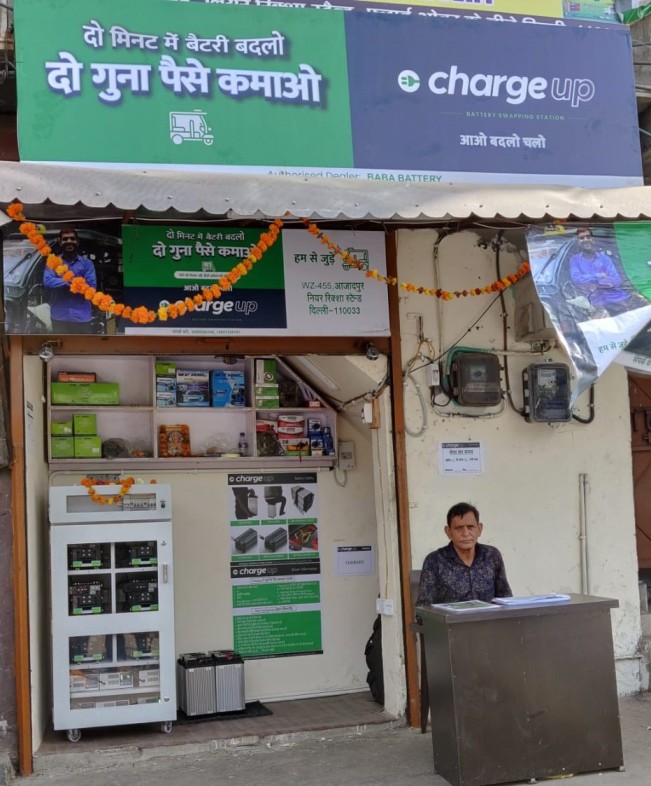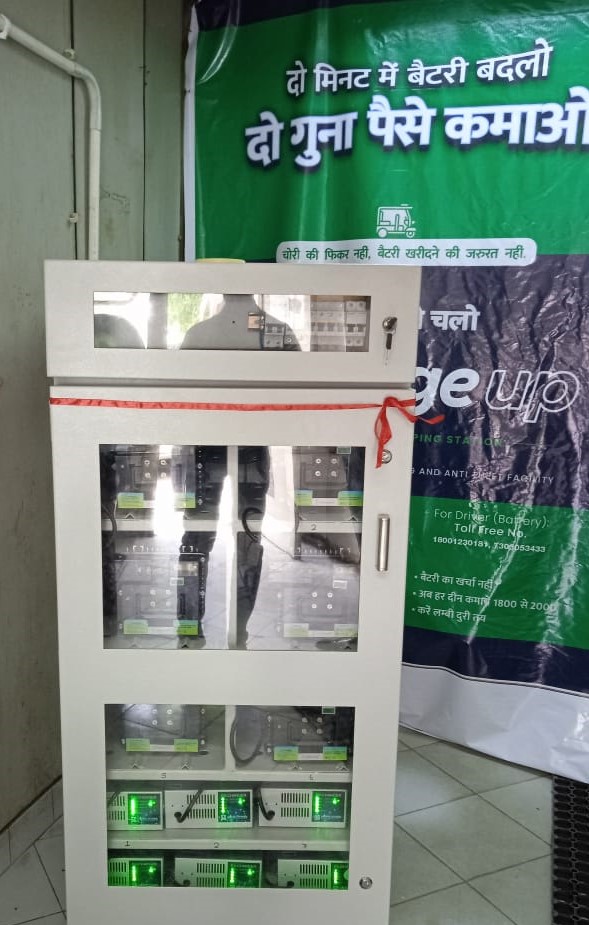With a spike in electric vehicle owners in India, there is a dire need to establish a vast infrastructure of electric charging points across the country. Now, it takes an average of 5-6 hours to charge the vehicle. If the number of charging points available are not adequate, the time needed to recharge the battery further increases. Battery swapping is an alternate and feasible solution to this problem.
Delhi-based eChargeUp offers this service to electric rickshaw drivers. This is not only increasing the incomes of the drivers, but also saving tonnes of carbon footprint. With 320 electric rickshaws in Delhi-NCR swapping batteries every day, the EV startup claims to have saved around 500 tonnes of CO2 emissions in one year.
Founded by Varun Goenka and Akshay Kashyap in 2019, the venture offers a battery swapping model called ‘Battery As A Service (BAAS)’ to e-rickshaws. This is a subscription-based model wherein drivers sign up for a battery rental plan, minus any upfront costs. Every swap costs Rs 150, and the driver can avail of the service 2-3 times a day. In other words, the driving cost per kilometre is only Rs 1.3, thus allowing the driver to cover more distance without worrying about the hassle of recharging the drained battery.

“We are living in an age where global warming and environmental degradation are among the most pressing issues. The solution lies in sustainable innovations. We wanted to provide better earning opportunities for e-rickshaw drivers using eco-friendly technology, and help them with the perennial problem of charging batteries, which greatly diminishes revenue-generating possibilities,” Varun tells The Better India.
Akshay adds that the battery swapping technology can possibly tackle the challenge of unstandardised batteries across various automakers.
The need for battery swapping vis-a-vis India’s electric future

After running his family business of textiles and petroleum in Guwahati for 16 years, Varun (38) moved to Delhi to work for Atlanta Energy, a clean-tech firm. As the CEO of the company, he learnt about the untapped and vast market of electric vehicles that was set to explode in the near future.
“I gained in-depth understanding of the role of technology in promoting clean energy, and identified a key area of improvement for the e-mobility sector in the country,” says Varun, who is a commerce graduate from Guwahati University, Assam.
Meanwhile, Akshay (43) is a first-generation entrepreneur who is passionate about creating an impact on the transition of mobility to a net-zero carbon future. He studied Mechanical Engineering from the Florida Institute of Technology and did a diploma in Finance and Operations from Wharton School. After working for an American firm, he dabbled in his family business of natural gas fuel for a few years, before joining Varun.
Both founders come with a plethora of experience and expertise, and chose e-rickshaws as their primary vehicle to implement sustainable innovation. Their sole aim was to address the problem of charging EV batteries, in terms of how long the process takes, and how it limits the drivers from generation revenue. Varun invested Rs 1.2 crore to establish the startup and subsequently, MapmyIndia came on board as an angel investor.

“Around 80% of electric vehicles in India today are e-rickshaws. They are the most affordable means of clean transportation. There are over 2.4 million such vehicles in the country transporting around 140 million people each day. With battery swapping, the driver won’t have to bear operating costs, which he otherwise has to if the battery is fixed with the vehicle,” Akshay says.
Features of battery swapping
- eChargeUp provides made-in-India advanced Lithium-ion batteries weighing 13 kilos. This makes them much easier to handle, compared to a conventional vehicle where the battery weighs 120 kilos.
- It takes two minutes to replace the drained battery with the charged one.
- The rickshaws cover a distance of 200 km/day by swapping batteries, as against 80 km if the batteries were recharged.
- The rickshaw owner has to pay only Rs 150 per swap. eChargeUp provides advanced technical support to sustain the committed distance and battery life cycles.
- The process can be done in one of their three battery swapping stations around Delhi/NCR.
- Drivers can make the payment by cash or UPI, and the packages are aligned with the per km cost of customers.
- To date, batteries provided by the company have covered a distance of two million kilometres. With ongoing expansions, the company aims to achieve 5,00,000 km per month.
- The drained battery is recharged for reuse at the swapping station. If the battery life comes to an end, the company deposits it with e-waste recyclers. The recycled battery is then supplied to solar power-based industries.
Vijender Kumar, who owns an e-rickshaw in Delhi, says his per day income has increased from Rs 800 to Rs 2,000 after signing up for the rental plan. “It is more convenient for me to use the swapping service, which allows me to take more rides. Increased income also allowed me to move my family from Bihar to Delhi,” he says.
Get in touch with eChargeUp here
Edited by Divya Sethu
No comments:
Post a Comment